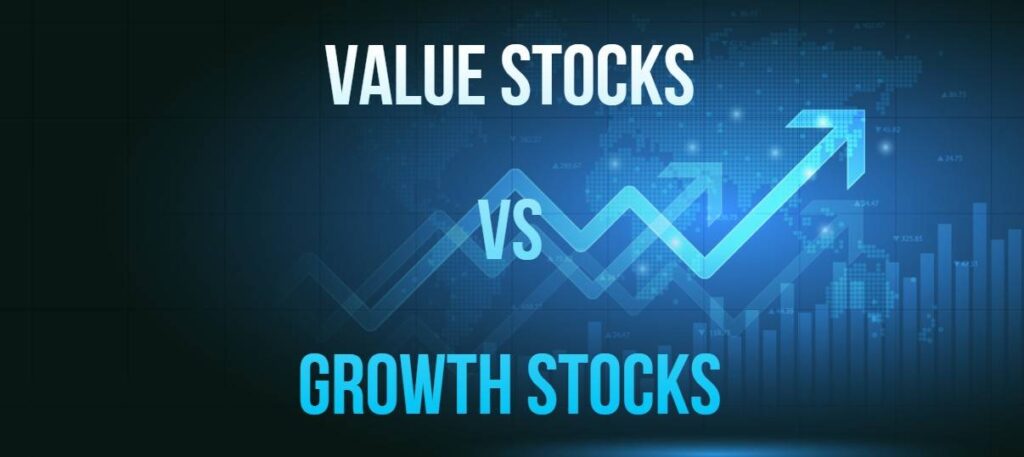
The value stocks vs growth stocks debate have long been a part of the Wall Street investing circles as participants endeavor to identify the most lucrative opportunities. Certainly, a number of differences exist between value and growth stocks, but in reality, they both can overlap most of the time since some stocks incorporate attributes of both value and growth investing.
In this article, we have explored the multiple aspects of this value stocks vs growth stocks question, explaining which one of them might be better for you.
What are growth stocks?
Growth stocks, also known as momentum stocks, refer to the shares of companies that hold the potential to outperform their competitors over time. These stocks are considered to have a remarkable expansion capability due to their growth-inclined infrastructure, which can be a result of optimal management, efficient operations, or an exceptional line of products. Such organizations strive to quickly achieve a leading position in their industry by focusing on “revenue built-up” even at the expense of profitability. However, eventually, they concentrate on enhancing the profits as well.
Moreover, it is noteworthy that the upward surge of growth stocks may not necessarily be backed by solid company fundamentals. In some cases, these stocks experience a positive loop built upon optimistic market sentiments and exceeding investors’ expectations instead of actual metrics.
Further, growth companies can be from any market segment, including small-cap, mid-cap, or large-cap sectors, provided they integrate a “potential.” There is no set rule that only small or developing businesses can come under the growth umbrella.
What are value stocks?
Value stocks refer to the stock shares that are being traded below their deserving worth. These stocks mostly belong to well-established and large organizations that are not being traded true to their earnings, revenue, or other valuation measures. This undervaluation is mainly caused by a negative public attitude towards the respective company, mainly emanating from internal scandals, unethical practices, or any other notable incident at the firm.
Overall, value stock companies integrate solid financials, stable setups, and reasonable revenue growth rates as opposed to the energetic structure of growth corporations.
Value stocks vs growth stocks: Key differences
Here we have analyzed the value stocks vs growth stocks contest relative to a number of factors. Let us look at them one by one:
1. Value or pricing
Due to their upbeat growth pressure and correct market valuation, growth stocks mostly fall under the “high price” stocks category. On the other hand, value stocks are undervalued shares; hence, they are often priced much lower than their counterparts.
To understand the valuation map of these stocks, here is a simple example:
Growth investors look for $50 stocks that could be worth $100 or $200 after a few years under ideal conditions. The current valuation of these stocks is correctly placed at $50, and the future growth prospects are purely speculation-based.
In contrast, value investors search for $50 stocks that actually have a higher worth today, suppose $100 or $200, but their present price ($50) does not follow it. In other words, the ‘current’ worth of value stocks does not reflect their true intrinsic value, indicating that this maladjusted $50 pricing would ultimately reach its deserving stature.
2. Metrics
Growth stocks generally accommodate above-average metric ratios, such as price-to-earnings ratio, price-to-book ratio, and earnings per share, among other measures. Contrarily, value stocks assimilate average or below average metrics in light of their undervaluation.
3. Affiliated businesses or companies
Growth stock companies are usually new and developing companies with an innovative business operational model. Whereas value stocks are mostly well-settled and large organizations that hold lower valuations for a variety of reasons.
In reality, the defining boundary between growth and value spheres can be hazy as several institutions are undervalued but also incorporate a massive growth potential in addition to their current unrealized value.
4. Performance
There is no defined criterion to rank the historical performance of value stocks vs growth stocks, as results may vary according to the chosen time frame and consequent risks. More generally, value stocks tend to perform better over the long-term while growth stocks deliver impressive returns in shorter time periods. During 2015-2019, large-cap growth stocks outperformed the large-cap value stocks by a cumulative 30 percent, according to a portfolio management Director at Buckingham.
A recent outlook: Nowadays, value stocks are dominating over growth investments, after many years, amid a turbulent economic environment. With rising inflation, surging interest rates, and post-pandemic suffering of tech firms, the most popular growth stocks, FAANG, have shed significant value, with Meta Inc. and Netflix losing around 50%-60% in value YTD. Further, the Russell 1000 Growth Index is down more than 18% since the start of 2022 compared to the Russell 1000 Value Index’s 8% YTD change.
5. Risk and volatility
As a general rule, growth investments involve a high volatility risk because their future price predictions are completely uncertain. In contrast, value stocks consolidate a lower risk as investors would not be at a loss even if the price doesn’t move higher.
Value stocks vs growth stocks: Which one is better?
While neither value stocks nor growth stocks can be precisely designated as superior over the other, here are some points to help you understand which one might be better for you.
Growth stocks may be suitable for you, if:
- You have the ability to select the right emerging companies.
- You do not require dividend payments.
- You can tolerate violent price movements.
- You have the potential to timely secure growth profits before they tumble down.
Value stocks may be right for you, if:
- You have the expertise to avoid value traps.
- You are risk-averse and prefer relatively stable investment products.
- You need dividend pay-outs.
- You are comfortable with waiting long to acquire investment returns.
Closing thoughts
Value vs growth investing is a long-established debate amalgamated with various nuances and factors. It is not possible to give a definite ruling over this as things differ according to the time period, prevalent risk environment, industry or sector, individual characteristics, and periodic rebalancing of stocks and growth indices. Ultimately, investors should follow the basic investing and risk-management principles to establish a portfolio well-suited to their financial ambitions.
Read more:
https://thetradingbay.com/etfs-vs-stocks-which-one-is-better/
https://thetradingbay.com/top-10-green-energy-stocks-in-2022/












